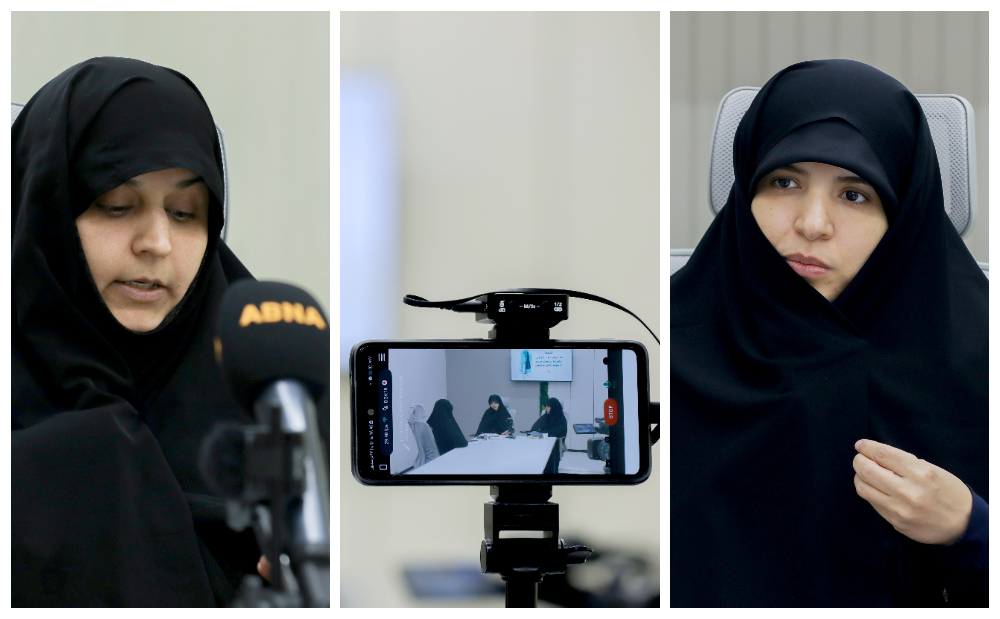AhlulBayt News Agency (ABNA): The session titled “The Necessity and Approach to Emulating the Lifestyle of Fatimah (a.s.) for the New Generation” was held on Sunday, November 25, 2024, in the conference hall of the AhlulBayt (a.s.) News Agency – ABNA.
In this session, Mrs. Masoumeh Fatemi, a researcher in women’s studies, and Mrs. Effat Arabzadeh, a professor at Jamiah al-Zahra (a.s.), shared their perspectives.
Lady Fatimah’s (a.s.) Courage in Defending the Wilayah Principle: Commendable
In her discussion on “Why the New Generation Should Emulate the Lifestyle of Lady Fatimah (a.s.),” Mrs. Fatemi highlighted that today’s world, with its all power, is working to set new role model for the new generation and promote its own lifestyle, seeking to align the public with its values.
Considering Lady Fatimah (a.s.) as a true and tangible role model for society, she emphasized, “It is essential to present Lady Fatimah’s (a.s.) lifestyle in a way that is understandable for today’s generation so that her exalted position does not become an obstacle to people emulating her. As the Supreme Leader of the Revolution has said, every aspect of Lady Fatimah’s (a.s.) life has been thoroughly explained, unlike the life of Lady Zaynab (a.s.), which is often reduced to her role in the uprising of Imam Hussain (a.s.).”
Mrs. Fatemi reflected on the challenges in Lady Fatimah’s (a.s.) life, such as the loss of her mother, the hardships in the Siege of Valley of Abu Talib, the persecution of the Prophet (p.b.u.h), poverty, and her role in jihad. “Despite all the difficulties she faced, Lady Fatimah (a.s.) did her best to carry out her duties at every stage to ensure the survival of Islam. This makes her an ideal role model for our individual and social lives,” she noted.
She also described qualities like wisdom, dignity, honesty, and simplicity as key aspects of Lady Fatimah’s (a.s.) character, stressing that “The courage and determination of the daughter of the Prophet (p.b.u.h) in defending the principle of Wilayah is commendable. Despite her challenging circumstances, including pregnancy, she personally reached out to every individual, speaking with them to ensure that Imam Ali (a.s.) was not left isolated.”
Further, emphasizing Lady Fatimah’s (a.s.) spiritual status and her commitment to both social and religious responsibilities, Mrs. Fatemi added, “Lady Fatimah (a.s.) was also fully engaged with her household duties, as she understood that women are the foundation of the family and Islam places great importance on preserving the family unit.”
Concluding her remarks, Mrs. Fatemi quoted the Supreme Leader’s statement, “The Iranian Muslim woman is at the peak,” affirmed, “Explaining the lifestyle and achievements of the Iranian Muslim woman is part of the Enlightening Jihad and plays a crucial role in spreading and presenting the lifestyle of Lady Fatimah (a.s.).”
The Need to Expose the Futility of the Western Woman’s Role Model
Following the meeting, Mrs. Arabzadeh stressed the importance of understanding the present era, explaining, “Today’s global discourse is shaped by postmodernism, which ultimately leads to individualism and humanism. This gives rise to the misconception that emulation is meaningless and ineffective.”
“Ironically, even proponents of postmodernism acknowledge that emulation is part of human Fitrah (human divine nature,) and while they may ignore it, they are doing their best to make society follow their own models and make others bow for them,” she continued.
The professor at Jamiah al-Zahra (a.s.) emphasized the need for a reformed approach to emulation, stating, “Conscious emulation is a valuable and righteous choice, and we must be mindful in selecting our role models. Humans, by their Fitrah, seek truth and goodness, and are naturally drawn to virtuous actions and adopt examples.”
Mrs. Arabzadeh, referring to the Supreme Leader’s words, highlighted the gap in available role models within society, saying, “Our failure to present an authentic and pure role model suited to today’s audience has allowed the enemy’s model to take root in the minds of the Iranian public. If we can show and explain the futility of the Western woman’s model, a true example like Lady Fatimah (a.s.) will take its place in people’s hearts.”
She then asked, “How can a woman who lived 1,400 years ago be a role model for today’s woman?” and responded, “We cannot simply apply the structures of the past to today’s world. Instead, it is essential to convey the essence of Lady Fatimah’s (a.s.) life to today’s society. She will remain a model for women throughout all ages due to her comprehensive and multifaceted character.”
The professor concluded by saying, “Sometimes we exaggerate certain aspects of Lady Fatimah’s life and present them as a role model, which can hinder emulation. If she had been an unachievable figure, she would never have been introduced as a role model. Today, inspired by Lady Fatimah’s (a.s.) unwavering commitment to Wilayah, women in the Resistance Movement defend the cause of truth with all their strength.”
**************
End/ 345

